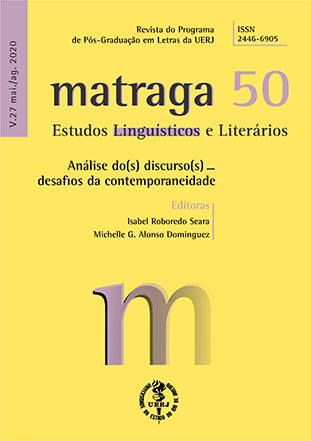Kierkergaard e Comte-Sponville: dois posicionamentos acerca do desespero
DOI:
https://doi.org/10.12957/matraga.2020.47001Palavras-chave:
interdiscursividade, discurso filosófico, desespero, Comte-Sponville.Resumo
O presente trabalho tem como meta proceder à análise da relação de contraposição entre o discurso de André Comte-Sponville (1952-) e o do filósofo dinamarquês Kierkergaard (1813-1855) no que tange especificamente ao modo de abordar a paixão do desespero. Com base na análise, podemos dizer que, por considerar o desespero de modo positivo, de maneira oposta à do filósofo dinamarquês, Comte-Sponville se posiciona não só em relação a Kierkergaard, mas também em relação a toda uma tradição do pensamento ocidental. Entendemos que, na malha interdiscursiva que o envolve, o pensamento do filósofo francês ainda se mostra capaz de dialogar com os discursos sobre o desespero tecidos na contemporaneidade, uma vez que, ao euforizar “um aprender a viver sem esperanças”, afirma a imagem moderna de um mundo vivido na distopia. Para levar a efeito a análise, nos ancoramos em conceitos extraídos da Análise do Discurso Francesa (MAINGUENEAU, 2008) e da Semiótica Discursiva (GREIMAS; COURTÉS, 1979; SARAIVA, 2012; OLIVEIRA, 2019), tendo em vista as convergências possíveis entre esses dois campos de pesquisa.
Downloads
Downloads
Publicado
Como Citar
Edição
Seção
Licença
AUTORIZAÇÃO
A Matraga – Revista do Programa de Pós-Graduação em Letras da UERJ está autorizada a publicar o artigo ora submetido, caso seja aceito para publicação online. Fica atestado que a contribuição é original, que não está sendo submetida a outro editor para publicação, e que a presente declaração é a expressão da verdade.
Os trabalhos publicados no espaço virtual da Matraga – Revista do Programa de Pós-Graduação em Letras da UERJ serão automaticamente cedidos, ficando os seus direitos autorais reservados à Matraga. Sua reprodução, total ou parcial, é condicionada à citação dos autores e dos dados da publicação.

A Matraga utiliza uma Licença Creative Commons - Atribuição-NãoComercial 4.0 Internacional.





